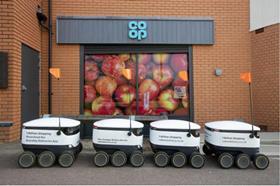
Co-op continues to expand its autonomous robot deliveries, rolling out a fleet of Starship Technology droids on the streets of Northampton today, (25 November). The move comes as the retailer ramps up its online and click and collect services.
Co-op has ambitions to use as many as 300 of Starship’s robots by the end of 2021 as it looks for more towns and cities to operate autonomous deliveries after launching in Milton Keynes, and then Northampton.
Co-op became the first convenience retailer to use same-day robot deliveries in the UK when it teamed-up with Starship Technologies in early 2018 to offer emission free online home delivery services in Milton Keynes and surrounding areas including Newport Pagnell and Bletchley.
The autonomous service will now expand to a second UK town, Northampton, serving around 5,000 households with contactless deliveries initially from the Co-op food store in Wootton Fields serving communities in Wootton and Hardingstone, with the robots typically travelling up to three miles from the store.
Co-op has ramped up its online offer to meet demand, and is now on track to offer online on-demand convenience, through its own online shop – coop.co.uk/shop – and with partners, from more than 1,000 of its stores by the end of this year (2020) - surpassing its estimate of 650 stores which it made at the start of the year. Orders are fulfilled through the Co-op online shop and through its partnerships with Starship Technologies, Deliveroo, Buymie (Bristol) and Pinga (East London) in as little as under one hour, and up to seven days in advance.
Starship Technologies is the world’s leading provider of autonomous delivery services, and its robots have completed over 500,000 commercial autonomous deliveries in local neighbourhoods and university campuses across five countries – with the robots having travelled over one million autonomous miles.
Chris Conway, Head of eCommerce, Co-op, said: “We continue to look for new ways to innovate and expand access to our products and services to deliver a truly compelling offer for consumers. Our partnership with Starship enables Co-op to offer further availability, flexibility and choice to meet community shopping needs for on-demand convenience. We have seen big changes in eCommerce this year with new customers using the channel that have never used it before, and seeing the benefits. Offering quality and value quickly, easily and conveniently is core to Co-op’s approach - delivering what our Members and customers want, when and where they need it.”
Andrew Curtis, Head of UK Operations at Starship Technologies, said: “We are thrilled to expand our service in the UK and bring robot delivery to neighbourhoods across Northampton from today. We have been humbled by the fantastic reception to our robots from local communities in Milton Keynes over the last two and a half years. This is the next step in our growth ambitions as Starship looks to further roll out our services across the UK following increasing demand during the pandemic.”
Northampton residents can access groceries delivered by robot through the Starship Food Delivery app (iOSand Android) – choosing from a range of more than 1,000 of their favourite food or drink items from the Co-op. They then drop a “pin” where they want their delivery to be sent, and can watch in real-time as the robot makes its journey via an interactive map. Once the robot arrives, they receive an alert and can then meet and unlock it through the app.
Demand for Starship’s robot service has continued to soar during the Covid-19 pandemic, with delivery numbers for Co-op products tripling in Milton Keynes alone in recent months - the robots provide contactless deliveries, which allow people, including the elderly and more vulnerable that may be spending more time at home, to get their groceries delivered straight to their door.
Wider community benefits of robot delivery were first seem pre-pandemic, with a “thank you” note sent by a customer recovering from major surgery who saw the home delivery service as a lifeline.
The robots use a combination of sensors, artificial intelligence and machine learning to travel on pavements and navigate around any obstacles. Computer vision-based navigation helps the robots to map their environment to the nearest inch, and as they are battery powered they help reduce both pollution and traffic congestion levels.



